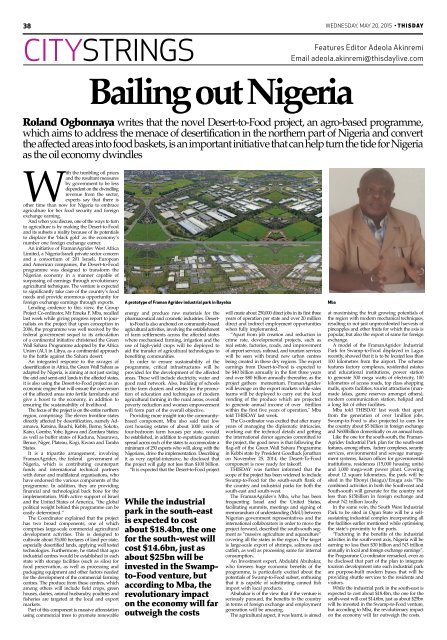Create successful ePaper yourself
Turn your PDF publications into a flip-book with our unique Google optimized e-Paper software.
38<br />
WEDNESDAY, MAY 20, 2015 • THISDAY<br />
CITYSTRINGS<br />
Features Editor Adeola Akinremi<br />
Email adeola.akinremi@thisdaylive.com<br />
Bailing out Nigeria<br />
Roland Ogbonnaya writes that the novel Desert-to-Food project, an agro-based programme,<br />
which aims to address the menace of desertification in the northern part of Nigeria and convert<br />
the affected areas into food baskets, is an important initiative that can help turn the tide for Nigeria<br />
as the oil economy dwindles<br />
With the tumbling oil prices<br />
and the resultant measures<br />
by government to be less<br />
dependent on the dwindling<br />
revenue from the sector,<br />
experts say that there is<br />
other time than now for Nigeria to embrace<br />
agriculture for her food security and foreign<br />
exchange earning.<br />
And when you discuss, one of the ways to turn<br />
to agriculture is by making the Desert-to-Food<br />
and its subsets a reality because of its potentials<br />
to displace the ‘black gold’ as the economy’s<br />
number one foreign exchange earner.<br />
An initiative of FramanAgridev West Africa<br />
Limited, a Nigeria-Israeli private sector concern<br />
and a consortium of 201 Israeli, European<br />
and American companies, the Desert-to-Food<br />
programme was designed to transform the<br />
Nigerian economy in a manner capable of<br />
surpassing oil earnings through revolutionary<br />
agricultural techniques. The venture is expected<br />
to significantly take care of the country’s food<br />
needs and provide enormous opportunity for<br />
foreign exchange earnings through exports.<br />
Lending credence to this view, the Group<br />
Project Co-ordinator, Mr Emeka F. Mba, recalled<br />
last week while giving progress report to journalists<br />
on the project that upon conception in<br />
2006, the programme was well received by the<br />
federal government sequel to its articulation<br />
of a continental initiative christened the Green<br />
Wall Sahara Programme adopted by the Africa<br />
Union (AU) in Libya, as a continental approach<br />
to the battle against the Sahara desert.<br />
An integrated response to the ravages of<br />
desertification in Africa, the Green Wall Sahara as<br />
adapted by Nigeria, is aiming at not just saving<br />
the arid and semi-arid lands in the affected states,<br />
it is also using the Desert-to-Food project as an<br />
economic engine that will ensure the conversion<br />
of the affected areas into fertile farmlands and<br />
give a boost to the economy, in addition to<br />
ensuring the sustainability of livelihood.<br />
The focus of the project is on the entire northern<br />
region, comprising: The eleven frontline states<br />
directly affected by desertification, namely Adamawa,<br />
Katsina, Bauchi, Kebbi, Borno, Sokoto,<br />
Kano, Gombe, Yobe, Jigawa and Zamfara States;<br />
as well as buffer states of Kaduna, Nasarawa,<br />
Benue, Niger, Plateau, Kogi, Kwara and Taraba<br />
States.<br />
It is a tripartite arrangement, involving<br />
FramanAgridev, the federal government of<br />
Nigeria, which is contributing counterpart<br />
funds and international technical partners<br />
with donor and multilateral organisations, who<br />
have endorsed the various components of the<br />
programme. In addition, they are providing<br />
financial and technological back bone for the<br />
implementation. With active support of Israel<br />
and the United States of America, “the global<br />
political weight behind this programme can be<br />
easily determined.”<br />
The Coordinator explained that the project<br />
has two broad components, one of which<br />
comprises large-scale commercial agricultural<br />
development activities. This is designed to<br />
cultivate about 35,000 hectares of land per state,<br />
especially desertified lands, applying well tested<br />
technologies. Furthermore, he stated that agro<br />
industrial centres would be established in each<br />
state with storage facilities (such as silos) for<br />
food preservation, as well as processing and<br />
packaging equipment and other factors needed<br />
for the development of the commercial farming<br />
centres. The produce from these centres, which<br />
among others will include field crops, green<br />
houses, dairies, animal husbandry, poultries and<br />
fisheries are targeted at the local and export<br />
markets.<br />
Part of this component is massive afforestation<br />
using commercial trees to promote renewable<br />
A prototype of Framan Agridev industrial park in Bayelsa<br />
energy and produce raw materials for the<br />
pharmaceutical and cosmetic industries. Desertto-Food<br />
is also anchored on community-based<br />
agricultural activities, involving the establishment<br />
of farm settlements across the affected states<br />
where mechanised farming, irrigation and the<br />
use of high-yield crops will be deployed to<br />
aid the transfer of agricultural technologies to<br />
benefiting communities.<br />
In order to ensure sustainability of the<br />
programme, critical infrastructures will be<br />
provided for the development of the affected<br />
areas. These will include electricity, water and<br />
good road network. Also, building of schools<br />
in the farm clusters and estates for the promotion<br />
of education and techniques of modern<br />
agricultural farming in the rural areas, overall<br />
poverty reduction and women empowerment<br />
will form part of the overall objective.<br />
Providing more insight into the communitybased<br />
component, Mba also said that low<br />
cost housing estates of about 1000 units of<br />
four-bedroom farm houses per state, would<br />
be established, in addition to expatriate quarters<br />
spread across each of the states to accommodate a<br />
minimum of 250 experts who will, along with the<br />
Nigerians, drive the implementation. Describing<br />
it as very capital-intensive, he disclosed that<br />
the project will gulp not less than $100 billion.<br />
“It is expected that the Desert-to-Food project<br />
While the industrial<br />
park in the south-east<br />
is expected to cost<br />
about $18.4bn, the one<br />
for the south-west will<br />
cost $14.6bn, just as<br />
about $25bn will be<br />
invested in the Swampto-Food<br />
venture, but<br />
according to Mba, the<br />
revolutionary impact<br />
on the economy will far<br />
outweigh the costs<br />
will create about 250,000 direct jobs in its first three<br />
years of operation per state and over 20 million<br />
direct and indirect employment opportunities<br />
when fully implemented.<br />
“Apart from job creation and reduction in<br />
crime rate, developmental projects, such as<br />
real estate, factories, roads, and improvement<br />
of airport services, railroad, and tourism services<br />
will be seen with brand new urban centres<br />
being created in these dry regions. The export<br />
earnings from Desert-to-Food is expected to<br />
be $40 billion annually in the first three years<br />
and over $80 billion annually thereafter, as the<br />
project gathers momentum. FramanAgridev<br />
will leverage on the export markets while sales<br />
teams will be deployed to carry out the local<br />
vending of the produce which are projected<br />
to generate annual income of over 6trillion<br />
within the first five years of operation," Mba<br />
told THISDAY last week.<br />
The Co-ordinator was excited that after many<br />
years of managing the diplomatic intricacies,<br />
working out the technical details and getting<br />
the international donor agencies committed to<br />
the project, the good news is that following the<br />
flag-off of the Green Wall Sahara Programme<br />
in Kebbi state by President Goodluck Jonathan<br />
on November 25, 2014, the Desert-To-Food<br />
component is now ready for takeoff.<br />
THISDAY was further informed that the<br />
scope of the project has been widened to include<br />
Swamp-to-Food for the south-south flank of<br />
the country and industrial parks for both the<br />
south-east and south-west.<br />
The FramanAgridev's Mba, who has been<br />
frequenting Israel and the United States,<br />
facilitating summits, meetings and signing of<br />
memorandum of understanding (MoU) between<br />
Nigerian government representatives and the<br />
international collaborators in order to move the<br />
project forward, described the south-south segment<br />
as “massive agriculture and aquaculture”<br />
covering all the states in the region. The target<br />
is large-scale export of shrimps, salmons and<br />
catfish, as well as processing same for internal<br />
consumption.<br />
An Investment expert, Abdulahi Abubakar,<br />
who foresees huge economic benefits of the<br />
programme, is particularly excited about the<br />
potentials of Swamp-to-Food subset, enthusing<br />
that it is capable of substituting canned fish<br />
import with local products.<br />
Abubakar is of the view that if the venture is<br />
seriously pursued, the benefits to the country<br />
in terms of foreign exchange and employment<br />
generation will be amazing.<br />
The agricultural aspect, it was learnt, is aimed<br />
Mba<br />
at maximising the fruit growing potentials of<br />
the region with modern mechanical techniques,<br />
resulting in not just unprecedented harvests of<br />
pineapples and other fruits for which the axis is<br />
popular, but also the export of same for foreign<br />
exchange.<br />
A model of the FramanAgridev Industrial<br />
Park for Swamp-to-Food displayed in Lagos<br />
recently, showed that it is to be located less than<br />
100 kilometres from the airport. The scheme<br />
features factory complexes, residential estates<br />
and educational institutions, power station<br />
to generate 300 mega watts of electricity, 100<br />
kilometres of access roads, top class shopping<br />
malls, sports facilities, tourist attractions (manmade<br />
lakes, game reserves amongst others),<br />
modern communication station, helipad and<br />
a long list of other facilities.<br />
Mba told THISDAY last week that apart<br />
from the generation of over 1million jobs,<br />
Swamp-to-Food is also projected to earn for<br />
the country about $5 billion in foreign exchange<br />
and N600billion domestically on an annual basis.<br />
Like the one for the south-south, the Framan-<br />
Agridev Industrial Park plan for the south-east<br />
features, among others, factory complexes, security<br />
services, environmental and sewage management<br />
systems, liaison offices for governmental<br />
institutions, residences (15,000 housing units)<br />
and 1,000 mega-watt power plant. Covering<br />
about 12 square kilometres, the park will be<br />
sited in the Ebonyi (Isiagu)/Enugu axis.“The<br />
combined activities in both the South-east and<br />
South-south will generate for the country not<br />
less than $15billion in foreign exchange and<br />
about N2 trillion locally.<br />
In the same vein, the South West Industrial<br />
Park to be sited in Ogun State will be a selfsustaining<br />
industrial complex incorporating all<br />
the facilities earlier mentioned while optimising<br />
the state’s proximity to the ports.<br />
“Factoring in the benefits of the industrial<br />
activities in the south-west axis, Nigeria will be<br />
earning no less than $30 billion and N3 trillion<br />
annually in local and foreign exchange earnings”,<br />
the Programme Co-ordinator remarked, even as<br />
he disclosed that part of the plan to integrate<br />
tourism development into each industrial park<br />
are purpose-built modern buses that will be<br />
providing shuttle services to the residents and<br />
visitors.<br />
While the industrial park in the south-east is<br />
expected to cost about $18.4bn, the one for the<br />
south-west will cost $14.6bn, just as about $25bn<br />
will be invested in the Swamp-to-Food venture,<br />
but according to Mba, the revolutionary impact<br />
on the economy will far outweigh the costs.
















